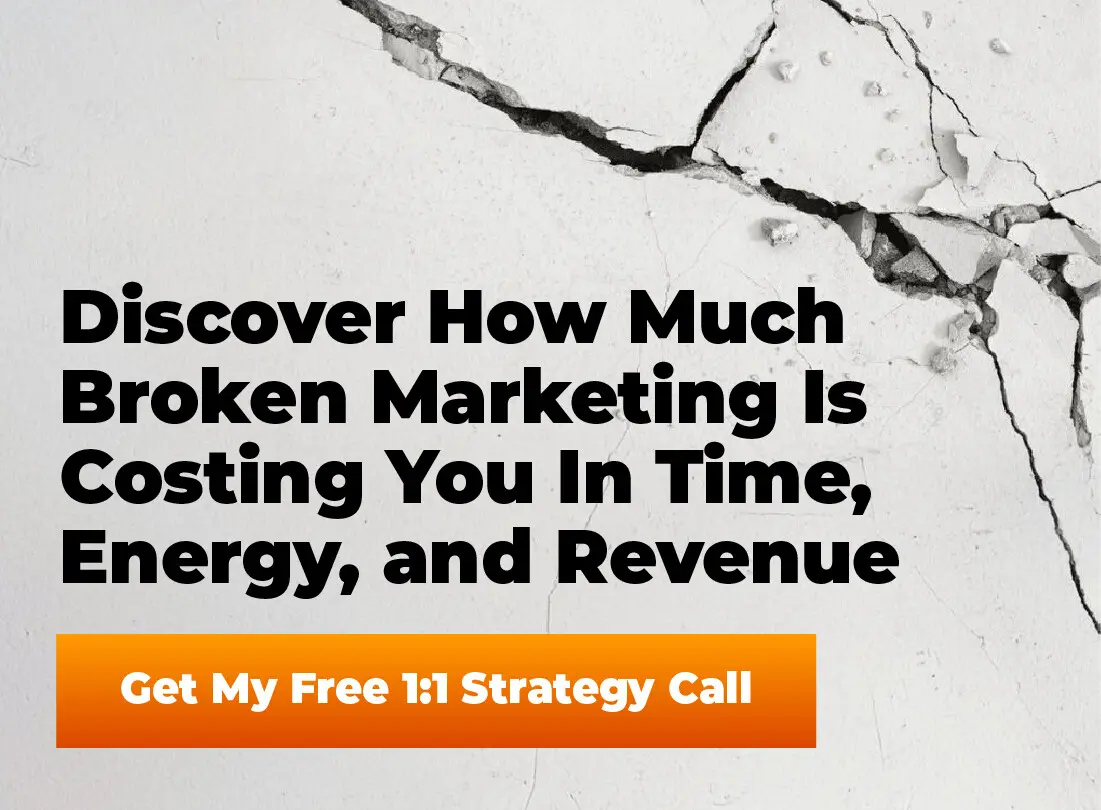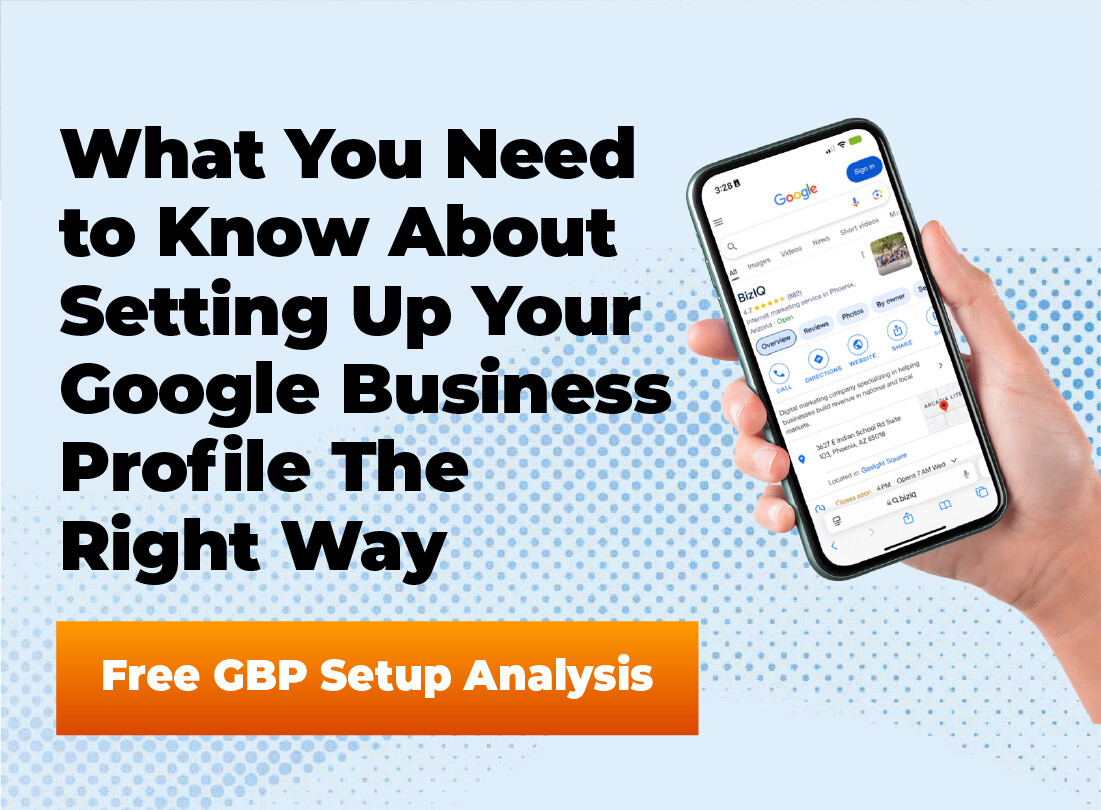Table of Contents
Are you a small business owner who feels overwhelmed when thinking about how to attract new customers? You’ve established your business, and now the challenge is drawing in those targeted, paying users, leaving you pondering, “Where should I begin?”
This is the core of marketing for small business. It uses various paid and organic methods. These strategies reach people who need your service or product.
Summary
- Effective small business marketing combines SEO, content, social media, reviews, referrals, and personalized messaging.
- Start with a mobile-optimized website, clear goals, keyword research, and a consistent content strategy.
- Amplify reach with partner promotions, review management, and real-world engagement like events and trade shows.
- Working with BizIQ ensures your strategy is focused, affordable, and tailored to generate qualified leads and long-term growth.
Defining Your Audience and Value
Before promoting your business, consider your product carefully. Who is your target market , and what makes your offering valuable to them? Why should a potential buyer choose your business over others?
Focus on gathering customer feedback and turn it into compelling case studies for your website. Showcase the success stories and testimonials of satisfied customers. This provides potential new buyers with a solid reason to choose your services.
Creating Your Marketing Goals
What specific outcomes do you want to achieve with your marketing campaigns ? Set SMART goals: specific, measurable, achievable, relevant, and time-bound. With clear objectives, you can accurately track progress of your marketing efforts.
For example, you might aim to boost engagement on your social media marketing platforms. Alternatively, your goal could be to increase sales and build brand awareness by achieving a specific percentage of organic clicks on your website each month. Defining your marketing goals is very important.
Your All-in-One Small Business Marketing Partner
Whether you’re just starting out or scaling up, BizIQ delivers full-service digital marketing built for small business success.
Crafting an Optimized Website
A website provides a way for people to find your small businesses . It serves as a central hub for information. A user-friendly website doesn’t have to be expensive.
You can display your contact information, share your company’s story, and list your business hours. Make your website accessible to everyone, demonstrating inclusivity and good faith. Consider a mobile-first approach so that people on mobile devices have an equally great experience.
Choosing a Domain Name
Select a “.com” domain name that matches your company name. Business researcher Jennifer Dublino notes that a website is crucial. It is often the starting point for building your online presence.
Create a list of potential domain names that are easy to remember. This will keep you organized. Think about registering the domain for an extended period, like a year or more.
Designing Your Site
Once you’ve chosen your hosting, focus on the website’s design. Will you use a pre-designed template? Or perhaps invest in a custom-built website?
Keep the design mobile-friendly, prioritizing a positive user experience. Collect user feedback early on. This is important as you develop your value proposition for marketing for small business.
SEO: Getting Found in Search
Search engine optimization is essential for potential clients to discover your brand and services. The top ten websites in Google’s search engine results get 86% of all organic clicks. This makes SEO a cornerstone of effective marketing.
You must use SEO in your marketing. It needs to be present to increase your chance of gaining customers. You need an SEO strategy .
Using Google Analytics
Google Analytics tracks website visitor data, providing comprehensive reports. Marketing platforms specialists use this data to analyze user behavior. The goal of this is to understand what encourages conversions.
Explore this guide for using Google Analytics effectively. If you’re a Salesforce customer, connect Google Analytics with Sales Cloud. This integration allows for better user data analysis and more personalized marketing activities.
Keywords For Small Business Marketing
How can you achieve top rankings in Google’s results to attract more traffic? Begin by conducting thorough keyword research. Find what your target audience is using when using search engines.
Identify the phrases and terms people use when searching for products or services like yours. You must research because customers may use different search terms than you expect. What are some common questions your ideal customer has that you can address?
Is Your Website Invisible on Google?
BizIQ’s local SEO experts help you rank higher, attract clicks, and show up right when customers need you most.
Content Marketing
Content calendars are great for organization. They provide a central location for scheduling blog posts, social media updates, and videos. These calendars support teamwork and streamline content creation.
Creating a content and search engine optimization plan helps attract new business. Consider writing blog articles that offer valuable insights related to your industry. Sharing valuable information positions your business as a trusted resource and boosts your online visibility.
Adding Fresh Content Regularly
Blog content can help establish expertise on any small business website. Develop an editorial calendar. Make a list of articles centered around industry-related keywords and topics.
Improve the SEO of your blog by creating content. Share content to gain authority and attract customers . Consistent blogging establishes your business as a knowledge leader, attracting more visitors and potential customers.
Email Marketing and Other Forms of Communication
Sending targeted email campaigns can spark interest. Effective campaigns inform subscribers about new products, offer exclusive promotions, and strengthen brand recognition. Email marketing is very valuable.
Crafted emails enhance engagement. However, combining emails with SMS messages ( SMS marketing ) can create an even stronger impact. Text messages offer direct communication, increasing customer interest and driving immediate action.
Personalizing Your Approach
Personalizing your messages to align with each user’s preferences is a powerful strategy. Research shows that 80% of buyers prefer purchasing from businesses that offer a personalized experience. Make your communication customer focused.
This personalized approach helps build brand awareness. The messaging will then feel customer-centric. Customers want to have personal feeling.
Using Social Media
Small businesses utilize social media marketing to promote their brand. They interact with followers to boost audience size. Facebook, YouTube, and Instagram are leading sales platforms.
Social media marketing allows users to discover new brands. They will find old established brands too. These platforms help increase awareness among potential leads.
Partnering Up
Partner marketing is an effective way to gain visibility. Collaborating with other businesses enables joint promotions. These partnerships expand your reach organically, introducing your brand to new audiences.
Explore opportunities to collaborate with other businesses. These collaborations lead to relationships. It can also increase your customer leads.
Turn Likes Into Loyal Customers
Need help managing Facebook, Instagram, or YouTube? BizIQ creates social media strategies that grow engagement and brand trust.
Going Offline: Real-world Experiences
Don’t rely solely on digital marketing efforts. Engaging in offline activities still offers substantial benefits. There are some limitations with a purely digital marketing strategy.
Trade shows and in-person meetings remain important for building connections and increasing engagement. Event promotion boosts earnings; 83% of brands use it for bigger sales. Effective marketing for small business requires creative, multi-faceted strategies.
Customer Reviews and Referrals
Claim and manage your small business listing on Google Business Profile. This platform allows you to manage your business locations, respond to user inquiries, collect customer reviews, and more. You should be managing your local presence, if applicable.
A referrals system can acquire new users at a low cost. This is very effective if you operate a local small business. Ask for referrals.
| Platform | Industry | User Count |
|---|---|---|
| Local restaurants and eateries | Over 2 Billion | |
| Most ecommerce brands | About 3 Billion | |
| Youtube | Creators or Vloggers | Around 2.5 billion |
Encourage your current customers to refer new buyers. Getting reviews on online spaces will bring in business. Customers read reviews.
Conclusion
Marketing for small businesses requires a combination of digital strategies, engaging user experiences, and real-world interactions. A varied approach enhances brand engagement. Determine your specific objectives to develop your value proposition.
Focus on the customer experience. Stay patient while growing your small business’s online presence. Building brand visibility and attracting a loyal customer base takes time and effort.
Why You Should Work with BizIQ
Marketing your small business can feel overwhelming—but it doesn’t have to be. BizIQ is built specifically to help small business owners like you navigate the digital world with confidence and clarity. Instead of trying to juggle SEO, content creation, email campaigns, and website optimization on your own, BizIQ brings all of these strategies together in one expert-managed solution.
Here’s how BizIQ helps you succeed:
-
Audience-First Strategy : We help you define your value, identify your target customers, and craft messaging that connects.
-
Goal-Oriented Planning : With our support, you’ll set clear, actionable goals and track your marketing performance with tools like Google Analytics.
-
Search Engine Visibility : Our SEO specialists position your website where your customers are looking—on the first page of search results.
-
Optimized Online Presence : We create and maintain mobile-friendly websites, engaging content, and business profiles that drive traffic and build trust.
-
Content & Email Marketing Made Easy : From blogs to email campaigns, we handle the writing, scheduling, and strategy to keep your brand top-of-mind.
-
Social Media & Local Impact : BizIQ helps you stay active on platforms like Facebook, Instagram, and YouTube, while also guiding you through offline efforts like events and referral programs.
Bottom line: BizIQ removes the guesswork from marketing. We partner with small business owners to create affordable, effective, and data-driven campaigns—so you can focus on doing what you do best: running your business.
FAQs: Marketing for Small Businesses
1. I’m overwhelmed—where do I even begin with marketing my small business?
Start by identifying your target audience and what makes your product or service valuable to them. From there, set clear, measurable goals and build a simple, optimized website. Even small steps like claiming your Google Business Profile or creating a Facebook page can make a big difference.
2. Is SEO really necessary for my business?
Yes. SEO (Search Engine Optimization) is essential if you want potential customers to find your business online. With most users clicking on the top search results, investing in SEO helps improve visibility, attract traffic, and generate qualified leads.
3. How can I compete with bigger brands on a small budget?
Focus on cost-effective strategies like content marketing, email campaigns, and social media engagement. Use tools like Google Analytics to track performance and fine-tune efforts. Collaborating with partners and encouraging referrals are also powerful, low-cost ways to grow.
4. What’s the most effective way to reach new customers?
A multi-channel approach works best. Use social media to build awareness, email and SMS to nurture relationships, and local SEO to attract nearby customers. Also, never underestimate the power of word-of-mouth marketing through customer reviews and referrals.










